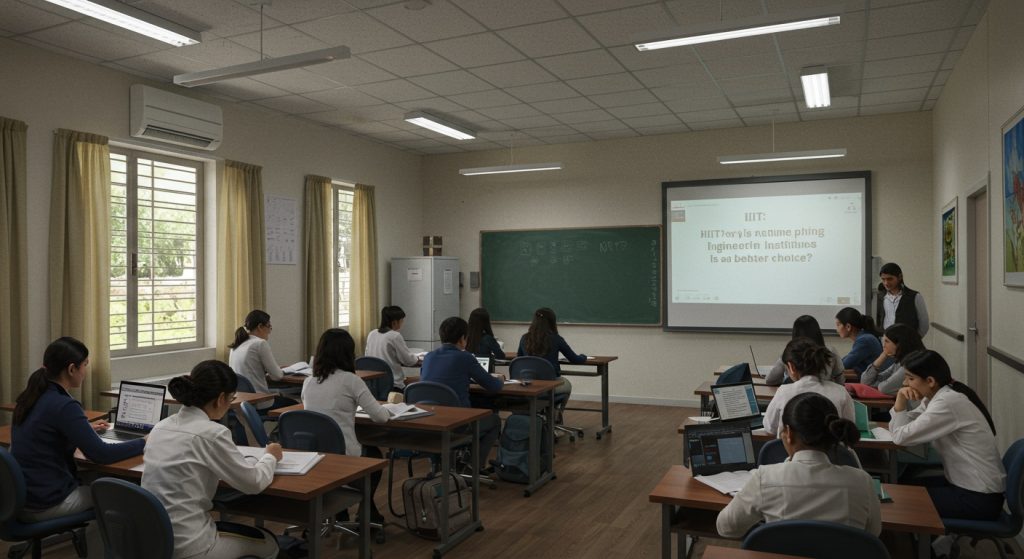The Indian Institutes of Technology (IITs) continue to be talent powerhouses. What’s the real story behind the headlines about crore-plus packages? We’ll delve into the salary trends for the graduating class of 2025, analyzing placement data across various IITs and disciplines. Expect a detailed look beyond the average figures, examining the distribution of salaries, the impact of specializations like AI and data science. The influence of recessionary concerns on hiring patterns. We’ll also explore the evolving role of international offers and the increasing prominence of domestic firms in shaping IIT placement outcomes. This focused analysis aims to provide a nuanced understanding of the current job market landscape for IIT graduates, revealing key insights for students, recruiters. Educators alike.

Decoding the Placement Landscape for the Class of 2025
The placement season for graduating students from the Indian Institutes of Technology (IITs) is always a high-stakes affair, closely watched by students, parents. Industry alike. As the Class of 2025 approaches graduation, understanding the trends and factors influencing salary packages is crucial for prospective students, current undergraduates. Companies looking to recruit top talent. This analysis aims to provide a comprehensive overview of the salary trends expected for the IIT Class of 2025, considering various factors such as specializations, industry demands. The overall economic climate.
Factors Influencing IIT Placement Salaries
Several factors contribute to the salary packages offered to IIT graduates. Understanding these drivers is key to interpreting placement trends.
- Branch of Study: Certain branches, like Computer Science Engineering (CSE), Electrical Engineering (EE). Increasingly, Artificial Intelligence (AI) and Data Science, typically command higher salaries due to the high demand for these skills in the tech industry.
- Institute Ranking: While all IITs are prestigious, the older and more established IITs (often referred to as the Top IITs) generally attract more companies and offer a wider range of opportunities, potentially leading to higher average salaries.
- Industry Demand: The demand for specific skills and roles in the job market plays a significant role. For example, the increasing focus on AI and machine learning has driven up salaries for graduates with expertise in these areas.
- Economic Conditions: The overall economic climate, both globally and within India, affects hiring trends and salary budgets. A strong economy typically leads to more job opportunities and higher salaries.
- Individual Skills and Achievements: Academic performance, internships, projects. Extracurricular activities all contribute to a candidate’s overall profile and influence their salary negotiation power.
Projected Salary Trends for the Class of 2025
Predicting precise salary figures is challenging due to the dynamic nature of the job market. But, based on current trends and industry projections, we can expect the following:
- Continued High Demand for Tech Skills: The demand for Computer Science, AI. Data Science graduates will likely remain strong, leading to competitive salary packages in these fields. Companies across various sectors are investing heavily in digital transformation, creating a need for skilled tech professionals.
- Growth in Emerging Fields: Areas like cybersecurity, blockchain. Quantum computing are gaining traction. Graduates with expertise in these niche fields could command premium salaries.
- Increased Focus on Interdisciplinary Skills: Companies are increasingly looking for candidates with a combination of technical and soft skills, such as communication, teamwork. Problem-solving. Graduates who can demonstrate these skills will have a competitive advantage.
- Potential Impact of Economic Slowdown: While the long-term outlook for tech jobs remains positive, short-term economic fluctuations could impact hiring rates and salary budgets. Companies may become more selective in their hiring processes.
Branch-Wise Salary Expectations: A Closer Look
While overall trends provide a general overview, understanding branch-specific salary expectations is crucial for students choosing their field of study.
- Computer Science Engineering (CSE): CSE graduates are expected to continue to receive the highest salary packages, driven by demand from tech giants, startups. Consulting firms. Roles like software engineer, data scientist. AI specialist will remain highly sought after.
- Electrical Engineering (EE): EE graduates are also in high demand, particularly in the semiconductor, electronics. Energy sectors. Opportunities in areas like power systems, control systems. Embedded systems will continue to be lucrative.
- Mechanical Engineering (ME): While traditionally not as high-paying as CSE or EE, ME graduates are seeing increased opportunities in areas like robotics, automation. Electric vehicles. Companies are also investing in R&D and manufacturing, creating demand for skilled mechanical engineers.
- Chemical Engineering (ChE): ChE graduates find opportunities in the chemical, pharmaceutical. Energy industries. With a growing focus on sustainability and green technologies, there is increasing demand for chemical engineers with expertise in these areas.
- Civil Engineering (CE): CE graduates play a vital role in infrastructure development. While salaries may not be as high as in tech-focused fields, there are stable job opportunities in construction, transportation. Environmental engineering.
The Role of Internships and Projects
Internships and projects are crucial for students to gain practical experience and demonstrate their skills to potential employers.
- Impact on Placement Offers: Many companies offer pre-placement offers (PPOs) to students who have performed well during their internships. These offers often come with higher salary packages.
- Demonstrating Practical Skills: Projects allow students to showcase their problem-solving abilities and technical skills. Well-executed projects can significantly enhance a candidate’s profile.
- Networking Opportunities: Internships provide valuable networking opportunities, allowing students to connect with industry professionals and learn about different career paths.
Preparing for Placements: Key Strategies
To maximize their chances of securing a good placement, students should focus on the following:
- Academic Excellence: Maintaining a strong academic record is essential. Companies often have minimum GPA requirements for candidates.
- Skill Development: Students should focus on developing in-demand technical skills, such as programming languages, data analysis tools. Machine learning algorithms.
- Soft Skills Training: Communication, teamwork. Problem-solving skills are crucial for success in the workplace. Students should participate in workshops and activities to enhance these skills.
- Internship Experience: Securing relevant internships is highly recommended. Internships provide practical experience and can lead to PPOs.
- Networking: Attending career fairs, connecting with alumni. Participating in industry events can help students build their network and learn about job opportunities.
Salaries Beyond the CTC: Understanding the Complete Package
It’s vital for students to interpret that the advertised salary (Cost to Company or CTC) is not the same as the take-home pay. The CTC typically includes components such as:
- Basic Salary: The fixed component of the salary.
- Allowances: Various allowances, such as housing allowance, travel allowance. Medical allowance.
- Performance-Based Bonuses: Bonuses based on individual or company performance.
- Stock Options: Some companies offer stock options, which give employees the right to purchase company shares at a specific price.
- Retirement Benefits: Contributions to retirement funds, such as provident fund (PF).
- Insurance: Health insurance and life insurance coverage.
Students should carefully evaluate the entire compensation package, including all the components mentioned above, to get a clear understanding of the true value of the offer.
Case Studies: Placement Success Stories
To illustrate the impact of preparation and skill development, let’s consider a few hypothetical case studies:
- Case Study 1: A Computer Science student from IIT Delhi, with a strong academic record, multiple internships at leading tech companies. Expertise in machine learning, received a pre-placement offer with a CTC of INR 50 LPA.
- Case Study 2: An Electrical Engineering student from IIT Bombay, who focused on developing skills in power systems and control systems, secured a job at a leading energy company with a CTC of INR 35 LPA.
- Case Study 3: A Mechanical Engineering student from IIT Madras, who participated in robotics competitions and developed skills in automation, received a job offer from a manufacturing company with a CTC of INR 25 LPA.
These case studies highlight the importance of academic excellence, skill development. Relevant experience in securing high-paying job offers.
The Impact of Location on Salary
The location of the job can also influence the salary package. Metropolitan cities like Bangalore, Mumbai. Delhi typically offer higher salaries compared to smaller cities, due to the higher cost of living and greater demand for talent.
Comparing IIT Placements with Other Engineering Colleges
While IITs generally command the highest salaries, it’s vital to compare their placement performance with other top engineering colleges in India. Institutes like the National Institutes of Technology (NITs) and Birla Institute of Technology and Science (BITS) also offer excellent placement opportunities. But, the average and median salaries at IITs tend to be higher due to their brand reputation and the caliber of their students.
Ethical Considerations in Placements
It’s crucial to acknowledge the ethical considerations surrounding IIT placements. The intense competition for jobs can put pressure on students. It’s crucial to maintain ethical standards throughout the placement process. Students should avoid engaging in any form of plagiarism or misrepresentation of their skills and experience. Companies should also ensure that their recruitment practices are fair and transparent.
Future Trends and Predictions
Looking ahead, several trends are likely to shape the IIT placement landscape:
- Increased Focus on AI and Automation: As AI and automation technologies continue to advance, the demand for professionals with expertise in these areas will only increase.
- Growth of the Gig Economy: The gig economy is expanding. More companies are hiring freelance professionals for specific projects. This could create new opportunities for IIT graduates.
- Emphasis on Sustainability: With growing concerns about climate change, there will be increasing demand for professionals with expertise in sustainable technologies and practices.
- Globalization of the Job Market: The job market is becoming increasingly global. IIT graduates are finding opportunities to work in companies around the world.
By staying informed about these trends and adapting their skills and knowledge accordingly, IIT graduates can position themselves for success in the ever-evolving job market. The Top IITs will continue to be the gold standard for engineering education in India and will continue to produce exceptional engineers and leaders.
Conclusion
The salary trends for the IIT Class of 2025 paint a compelling picture. Understanding the data is only half the battle. To truly leverage this data, consider this your “Implementation Guide.” Remember, while core engineering branches continue to command high salaries, the demand for specializations in AI and data science is skyrocketing, influencing compensation packages significantly. Don’t just focus on the highest average; research companies thoroughly. A slightly lower starting salary at a company with robust growth opportunities and a strong mentorship program can lead to far greater long-term financial and professional success. Action items include networking strategically with alumni in your desired fields and tailoring your skillset to meet industry demands. As someone who once undervalued soft skills, I can attest that communication and teamwork are critical for career advancement, often leading to faster promotions and higher raises. Success should be measured not only by your initial salary but also by your career trajectory and overall job satisfaction. Track your progress, adjust your strategy as needed. Remember that continuous learning is key to remaining competitive in a rapidly evolving job market.
More Articles
Engineering vs. Medical Careers: Which Path Offers Better Long-Term Financial Rewards?
Automation’s Evolution: Understanding Its Effects on Modern Engineering Roles and Skills Demanded
Salary Negotiation Secrets: Know Your Worth & Get Paid What You Deserve
Unlock Your Potential: Networking Events for Career Growth in 2025
FAQs
So, everyone’s talking about IIT placements! What’s the big deal with the ‘Salary Trends for the Class of 2025’ anyway?
, this analysis gives us a sneak peek into what kind of salaries graduates from the IITs are likely to land. It’s a good indicator of the job market, which industries are hiring. How much they’re willing to pay. Think of it as a compass for future engineering aspirants (and current students!) .
What factors typically influence the salary trends for IIT grads? Is it just about good grades?
Grades matter, sure. It’s way more than that. Demand in specific fields (like CS or AI), the overall economy, the reputation of the IIT, the specific skills a student possesses (like coding languages or data analysis). Even internship experience all play a significant role. It’s a complex mix!
Are we talking about average salaries here? Because averages can be misleading, right?
You’re spot on! Averages can be skewed by a few super-high offers. The analysis should ideally also consider the median salary (the middle value) and maybe even some percentile breakdowns to give a more complete picture of the salary distribution.
Which IITs usually top the charts when it comes to placement packages?
Generally, the older and more established IITs like IIT Bombay, IIT Delhi, IIT Madras. IIT Kanpur tend to have higher average salaries. But, newer IITs are catching up fast, especially in specific niche areas.
What kind of roles are we usually seeing these grads being hired for? Is it all coding jobs?
While coding jobs (software engineers, developers) are definitely a big chunk, IIT grads get hired for a wide range of roles. Think consulting, data science, core engineering positions (like mechanical or electrical), research. Even finance roles.
How much weight should I really give to these salary trends when deciding on a branch or even which college to apply to?
It’s good data to have. Don’t let it be the only factor. Choose a branch you’re genuinely interested in and good at. Long-term career satisfaction matters more than a starting salary. Think about what you enjoy doing – that’s what will drive success in the long run!
Okay, so where can I find reliable data about these IIT placement trends for the Class of 2025?
Look for official reports released by the IITs themselves. Reputable news sources and educational websites that specialize in this kind of analysis are also good. Just be wary of unofficial or unverified claims – stick to the data published by the institutions or analyzed by credible sources.



